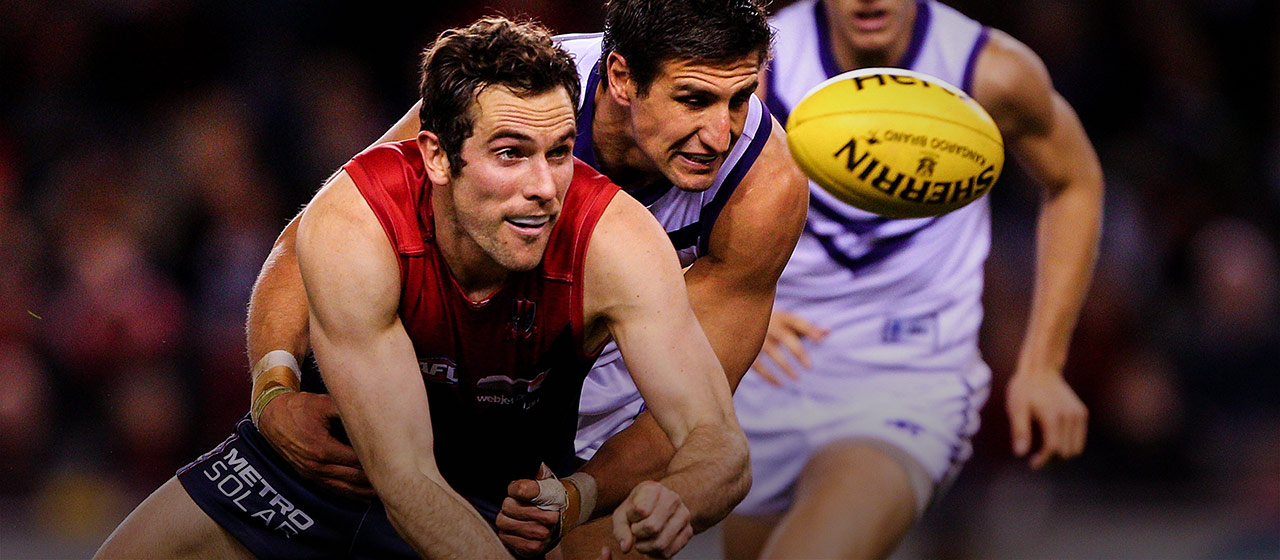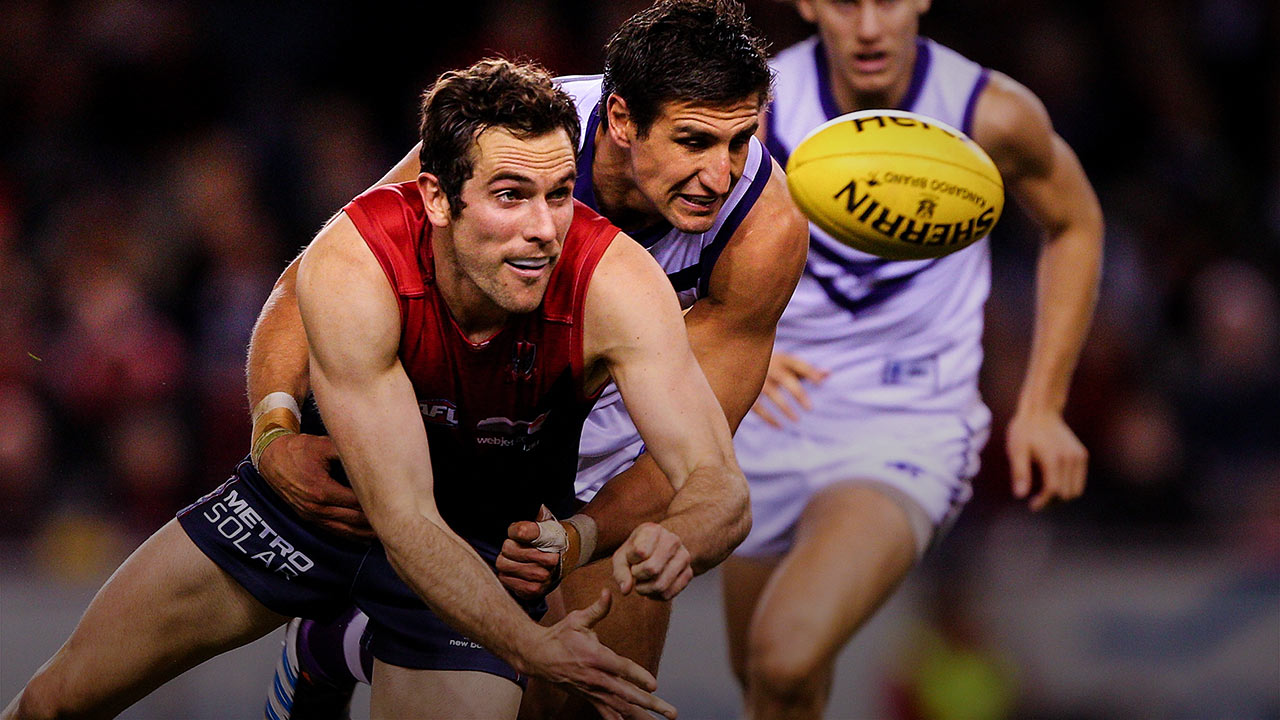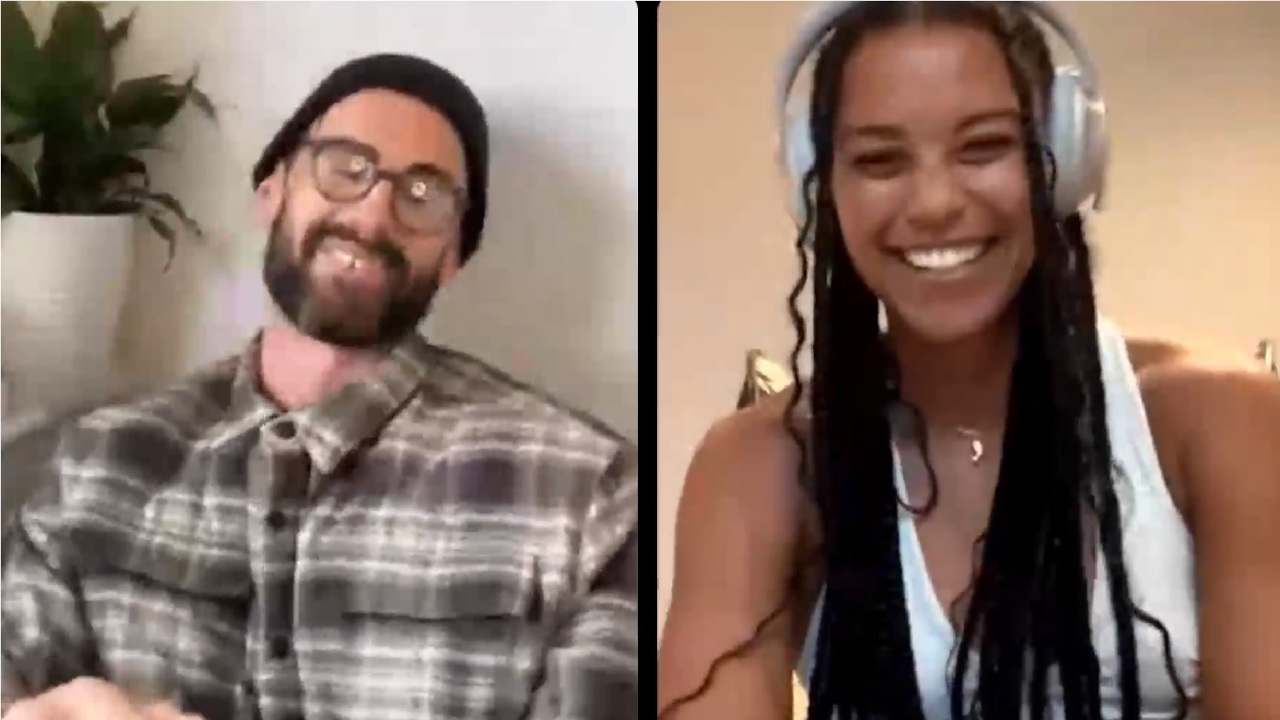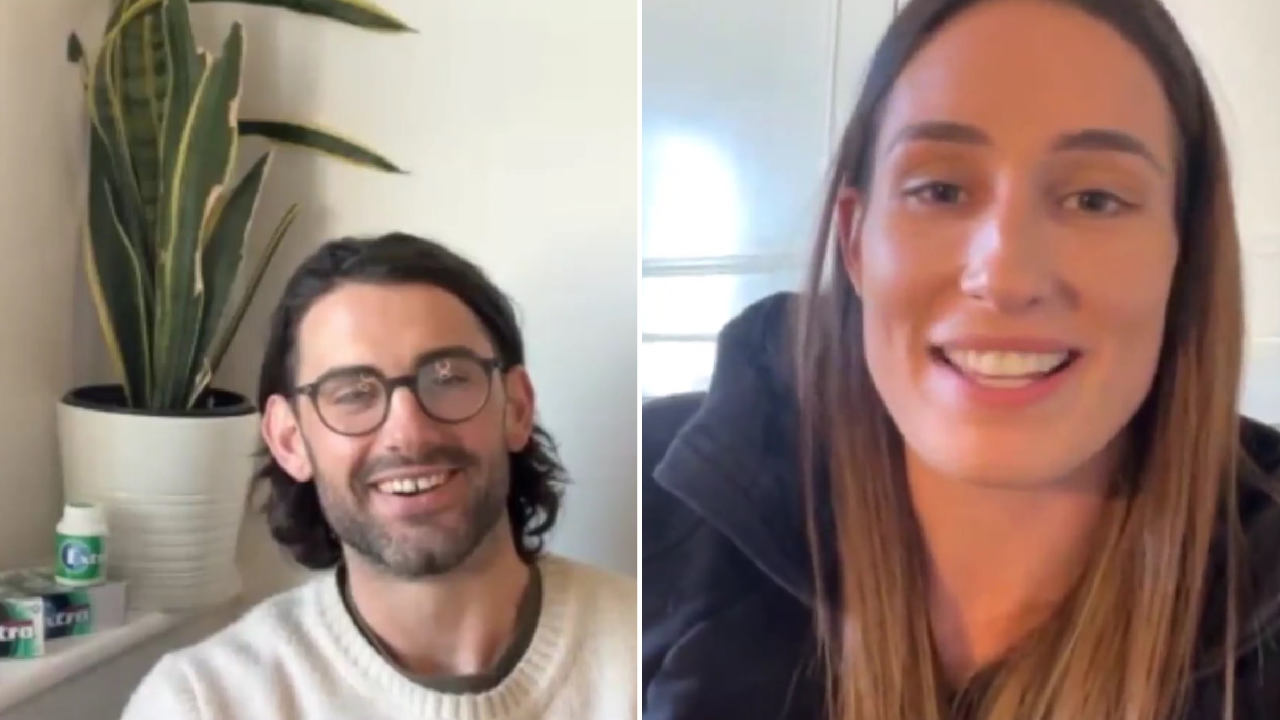AFL
From AFL to AFR rich list
I’ve always been fascinated with problem solving.
I think I’ve always had a curious mind, one that’s constantly asking, ‘Why can’t that be done better?’ As an average footballer, I think that helped me improve my career and stay in the AFL for 10 years and 124 games.
Outside of sport, in the business world, that inquisitiveness has led me to constantly asking, ‘Why isn’t there a product for that specific need?’
Mum was a mathematician, a maths teacher, and Dad worked in business development before becoming more philanthropic in the latter part of his career, helping the Royal Children’s Hospital and Heart Foundation raise money.
I was a pretty good maths student, which has been incredibly important in the world of software. From a sales and business development perspective, I think I picked up a lot of my father’s strengths. He’s fantastic at building and maintaining relationships, there is no BS with him and he is just really authentic.
It’s an incredibly important skill to master in any sales role as people typically make a purchase due to three trust factors: How much do they trust the product? How much do they trust the company? How much do they trust the sales person?
I think the combination of Mum and Dad’s strengths have been real weapons for me in the business world.
GetSwift appoints former Qantas chief information officer @Jamila_Gordon Gordon as its Global CIOhttps://t.co/XDZrTmyfJT pic.twitter.com/r5Q87CEmKO
— GetSwift (@getswift_) February 11, 2017
FROM FOOTY TO BUSINESS
With football I just loved competing, I loved playing with my mates. I think there was a drive to really make the most of whatever talent I had. I was lucky enough to carve out a bit of a career and was often in the position of getting the tap on the shoulder every second week that you’re either in or out of the side.
It was fairly volatile, you had to have a level of resilience to deal with those ebbs and flows.
I started a Bachelor of Business at University of Queensland when I was with the Brisbane Lions, started getting my fingers dirty in the business world, then finished the degree at Monash after I’d been picked up by Melbourne.
I naturally ended up learning more through running and growing businesses in a practical sense than I did in my university degree.
I started a t-shirt line at one point, leveraging off the idea that there were way too many mass-produced t-shirts. You’d go out on a Saturday night and see four guys in the same nightclub wearing the same shirt, and instantly that wasn’t cool at all.
We developed one-off, two-off t-shirts that quickly evolved into an online fashion store. I used to sell shirts to my teammates out of the back of my car, and we had distribution across 25 different boutiques around the country.
It’s an incredibly important skill to master in any sales role as people typically make a purchase due to three trust factors: How much do they trust the product? How much do they trust the company? How much do they trust the sales person?
Websites were getting easier and cheaper to build. Facebook had just hit the circuit and was experiencing extreme growth from an eyeball perspective.
That started giving me inspiration – if you focused on tech, the fundamental business, and then started looking to solve real-world problems, which in our case were logistical problems, then you could have a fantastic model with an unlimited ceiling of scale. That really excited me.
I ended up managing many technology companies during my football career. Often I was accused of being too focused on one of my businesses when I had a football career to focus on.
Life is all about balance, and my escape and balance at a very early age was creating and building businesses.

‘IT’S TIME TO MOVE ON’
There was that lightbulb moment when we got absolutely thumped one weekend and had a punishment session at 5am the next day, in the freezing cold water of Port Phillip Bay.
I thought, ‘I think it’s time to move on here, I’ve lost the passion for this.’ I was getting more excited about driving home from training and building my businesses than I was about playing football.
Once you get over the hill of 26, 27, and you’re physically trying to keep up and still improve, even though your body has peaked, it becomes a matter of mentally how are you getting stimulated?
Mentally, I was getting that via the business world.
I started Liquorun during my last year of AFL footy, 2013, with a couple of Melbourne teammates. The on-demand economy was just starting to pick up, asset-light companies like Uber and AirBnB were both in their early days.
We became very interested in learning a lot about the mathematics/algorithms involved in trying to move something from A to B in a really short period of time.
We didn’t want to own drivers, we didn’t want to own inventory, we didn’t want to own retail stores. We wanted to be asset-light and began to see retail stores as potential hyper-local distribution warehouses.
We believed this ‘chain’ of decentralised warehouses was the future of logistics if you were going to efficiently achieve really fast delivery times.
We were interested in learning holistically about pulling that model together, so we started with alcohol. It was just simple and easy – it’s not perishable, you can pick something up off a shelf and get it to someone really quickly by leveraging driver networks within the area.
We built a platform on the back of that, initially doing a lot of the delivery ourselves in inner Melbourne suburbs on scooters. Man, we have some funny stories from that period of our lives!
I thought, ‘I think it’s time to move on here, I’ve lost the passion for this.’ I was getting more excited about driving home from training and building my businesses than I was about playing football.
What happened quite quickly was the company grew in popularity, we expanded into Sydney and Brisbane, and then built an offshore team to manage the operation. They were responsible for working out where drivers were, dispatching drivers, making sure the route they used was the most efficient, as well as keeping customers updated from a tracking perspective.
But it was inefficient and non-technical – it was purely people sitting in front of computers running that from a manual process.
That clearly wasn’t going to scale – every time we expanded into a new city, our call centre got bigger. Technology could obviously solve our dispatching, routing and tracking challenges and so we did some analysis with an eye to building our own software. We met with businesses all over the world to learn how they were approaching similar challenges, some of them with billions on their balance sheets.

THE BREAKTHROUGH
Surprisingly, the majority of them were going through the same problems we were – these companies, big or small, were running on paper, on huge call centres, on clunky GPS tracking devices. It was at that moment that we thought, ‘Wow, this is a much broader global problem.’
The lightbulb went off, we knew this was a multi-billion dollar opportunity that we needed to go after.
We wanted to validate the software first, and verify through data that it would actually be a game-changer from a commercial viability perspective. So we doubled down on our engineering team, built what we termed a ‘delivery management platform’ that was going to manage our whole delivery operation – track drivers, automate dispatching, automate route optimisation and update the receiver in real-time.
The moment we rolled the platform out, the customers who used to call and ask, ‘Hey, where’s my delivery?’ stopped calling. The phones went dead. Within a month we didn’t need a call centre and started saving significant operational expenditure – the whole operation was soon on autopilot. The algorithms took over.
The platform that we had built had basically taken over our whole business and had made it so much better in so many ways. Revenues were going up, delivery speeds were getting faster, customers were buying more and coming back faster. They were spending more money online at the checkout cart and the platform became the catalyst to driving all of these positive metrics.
After a heap of improvements and iterations, we were finally satisfied we had the data to go back to the businesses that we’d talked to during our analysis period and say, ‘Hey, we just built this system, we’ve solved those problems you were talking about. Why not give us a go for free and, if you like it, we can work out a commercial structure for you?’
That was about three years ago, and that’s what became GetSwift. We had a couple of clients in a couple of cities. Fast forward to today – GetSwift software is utilised across 660 cities, 75-odd countries and 75 different verticals.
We were there at the right time, no question. The world was just starting to see glimpses of how software was beginning to completely change industries, or as I like to phrase it, ‘Software was eating the world!’
The lightbulb went off, we knew this was a multi-billion dollar opportunity that we needed to go after.
Supermarkets didn’t have automated checkout points at that point, you were still buying items and checking out via a human. That’s changed across many industries with the emergence of smart phones, cloud hosting, AI, machine learning and, soon to be, a new wave of disruption in robotics, blockchain etc.
We built version one of GetSwift, and were then able to refine it across multiple verticals, different geographic areas, different languages, and it evolved in a short period of time into a really robust, data-driven, machine-learning platform that now adds amazing value globally to businesses across a majority of their divisions.
It doesn’t matter what you do – as long as you’re moving something from A to B (parcel, flowers, people, the local plumber, food, medical devices etc), GetSwift can completely take any of those businesses to the next level.
Since floating on the ASX last December, GetSwift shares have gone up by more than 2000%.
We’ve signed a lot of global deals across a number of different industries.

NEW YORK INTENSITY
People ask if the speed of growth and success has shocked me. Surprisingly, no. We executed this year on exactly what we set out to execute. What excites me is we’re just getting started. We’ve had a good year, but I think 2018 will just blow more people away.
My world is very different to what it used to be. The scrutiny’s been even more intense than my football days. If I was to summarise the year, it’s one of feeling extremely proud to see that the people who backed us when we were just an idea are now being rewarded for that belief and trust.
We’ve been able to deliver what we said we’d deliver, and I’m really proud of that. We raised $24 million to build out a team for a couple of large contracts we announced, and we then raised another $75 million to keep fuelling demand.
Every day is different, every day is exciting, and every day you try to learn something, which keeps you alive.
Some of our customers are businesses who have been around for 20 or 30 years, and it’s completely changed the game for them. We’re talking pretty staggering year-on-year growth numbers that they simply haven’t seen in years. The money and success and the share price are all secondary. Making an impact is what gets me out of bed every morning.
I’m in New York 80 percent of the time, in the city, not too far from our office. I laugh sometimes and say I can tolerate three weeks out of every month in New York, then I need to get some air. It can be intense yet incredibly exciting living and competing in the city.
There are so many interesting people there to learn from, to find inspiration in and to surround yourself around.
My world is very different to what it used to be. The scrutiny’s been even more intense than my football days.
We have an amazing team. Bane Hunter, our chairman, and I have a pretty unique and strong partnership. Bane believed in us at a very early stage and brings a wealth of knowledge, skills and experience to the table.
We have been able to rise to many of the challenges along the journey and that has made us stronger as a partnership as well as a company.
I learned a very long time ago at the Brisbane Lions that a champion team will always defeat a team of champions, so building out the right team and ensuring we develop and protect a strong corporate culture is something Bane and I put a lot of our energy into.
I don’t think there’s an average day, it continues to surprise me. The fascinating thing about our story – and people actually don’t believe it! – is that we don’t have a sales force. There’s so much global demand for our product right now that we spend our time working out how we prioritise conversations and building out the right infrastructure and staff to support the demand and growth.

‘YOUR SHOUT!’
I get asked a few times, ‘Have you googled yourself lately?’ I haven’t, but I do get sent the odd article from an old colleague or teammate who’ve seen my name on the Financial Review Young Rich list and read that I’m supposedly worth $170 million.
They say, ‘Holy shit! Congrats! Your shout!’ You just have to laugh. What I learnt from playing football is you can’t read into your own press, that just sidetracks you from what’s important. And what’s important to us is to keep delivering value to our customers and shareholders and everything else will take care of itself.
Wealth and money may make life easier, but as Jim Carrey once said, ‘I think everybody should get rich and famous and do everything they ever dreamed of so they can see that it’s not the answer.’
For me, this isn’t about the money. We are passionate about making an impact on a global scale. We want to do what Facebook did to social media, but for last-mile delivery.
We want to be the focal touch point and platform when anything, anyone, anywhere at any time is being moved from A to B. The more people’s lives you improve, naturally more money will flow through the door.
If you start with money as your primary driver, then you’re setting yourself up for failure. Focus and be obsessed in delighting your customer. We start with the customer and work backwards from there with technology.
Too many companies start with technology and try and fit it around a customer. Our philosophy is you have a pretty good business if you have millions of happy customers.
For me, this is about making a global impact and then eventually being able to give back as much as I/we can. We have a long way to go but I really get a kick out of helping others and I feel like that gives you such a higher purpose than just trying to make more money.
Some people might view you as all of a sudden being a different person, because some article has painted you as being worth ‘X’. But I don’t think I’ve changed externally.
They say, ‘Holy shit! Congrats! Your shout!’ You just have to laugh. What I learnt from playing football is you can’t read into your own press, that just sidetracks you from what’s important. And what’s important to us is to keep delivering value to our customers and shareholders and everything else will take care of itself.
When I was playing football and now more recently being in the business world, the people who are at the top of their game are always the most curious, they listen more than they open their mouth, they are always trying to learn and improve every day and are always so positive and optimistic – I try to model my attitude in a similar fashion.
I love learning. I love hearing people’s stories and what makes them who they are today. Everyone can teach you something if you are open to it.
You can learn just as much from your 90-year-old grandma as you can from a toddler and now I’m obviously speaking in a more broader sense across more important aspects of your life – love, health and happiness.
What I consistently observe and learn from people who are way more talented, smarter, wealthier, healthier, happier and more spiritually alive than I am is they all live by pretty much the same principles – stay humble, stay curious, never lose the student mentality, make sure you keep learning every day, give more than you take, and try to always be a little bit smarter tomorrow than you were yesterday.
I caught up with a bunch of old teammates in Melbourne recently. I miss that camaraderie of having a few beers with the guys, catching up on old stories and having a laugh at the fact that everyone’s putting 30 percent of mayonnaise on top their stories to make themselves sound better.
I miss that banter, which I think every footballer says when they move outside the locker room.
As soon as you move on from a geographic perspective and you’re exposed to different stimuli, different media, different culture, different thought patterns, AFL can seem like a drop in the ocean.
Sometimes you scratch your head and wonder how people can be so caught up in it, but it’s a product of any environment. There’s people who follow it all their lives and that’s ok.
Football to some people is really important, but if that’s what gets you out of bed every morning you’re really not defining yourself as a person. There’s a lot more to life than just one industry or passion.
But it can be a great grounding. A lot of footballers don’t realise until years after they’ve finished that there’s a lot of intangible strengths that you pick up in your career.
Discipline, work ethic, teamwork, resilience, never giving up, getting back up when you get knocked down. They’re all really relevant to living life in general, and living it as a better person.
That’s what I have to thank football for. And the friendship group and broad network that I’ll have for life, I’ll always treasure that.
More about: Business






 Load More
Load More